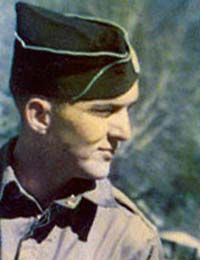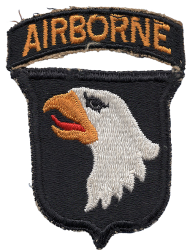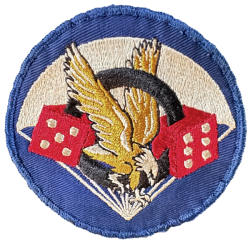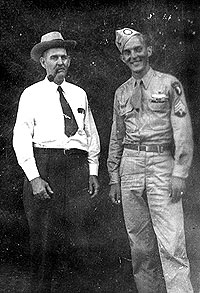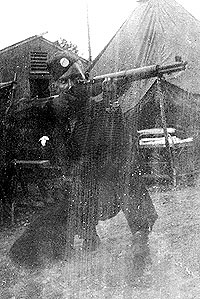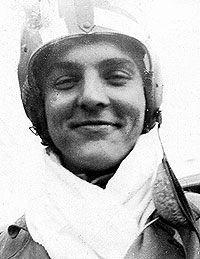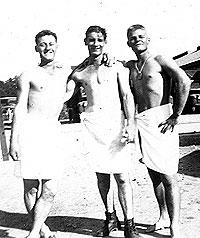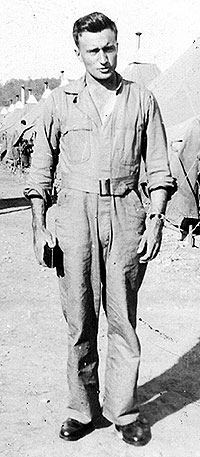This was it, June 5th 1944! We didn’t know it then, but the invasion had already been set back 24 hours once. That was when Eisenhower canceled the first jump because of weather. This was the real time. We would go now! It was early in the afternoon when we arrived at the airdrome. What a sight! All the old gooney birds, our planes, were lined up and painted with wide black and white stripes on their wings and fuselages. This was supposed to let everyone know we were the good guys. We checked out whatever other equipment we needed and our chutes from the big hanger. I had to get an English leg pack to carry my SCR-300 radio and two spare batteries.
It was a heavy load but would drop down beneath me, tied to my harness on a twenty-foot rope. It would hit the ground before me and take up some of the landing shock. All these things were planned and we didn’t worry about them. Our jump stick positions were assigned to each man. Some guys wanted to change to other planes, but that was not an option. The assignments would stay in place. After we loaded with our chutes, Mae West (a flotation life preserver), weapons, ammunition and leg packs, we sat around near the planes waiting. After a while the 3rd Battalion was ordered to assemble in a little opening beside the big hanger. We wondered what was going on. I left the leg pack at the plane and literally waddled to the formation, which was about 500 yards away. We still had our chutes and everything else on.
We wound around ending up in a small courtyard with a four foot high, two foot wide stone fence around it. An odd group of people gathered on one end of the field as we formed up in companies in a rather loose formation. Colonel Wolverton got up on top of the fence, and we gave him our complete attention. He asked a man to get up on the fence with him. The man was dressed in a German uniform, with the regular rig and helmet. He had him turn around and crouch. The Colonel said “Get used to this image, he is the enemy and he wants to kill us.” Then he had another man dressed as a German but his uniform was different. He said, “This is the German Paratrooper.” The Colonel told us, “Notice his helmet is smaller and is shaped differently. Get a good look at this image because you will probably see more of him than any other German. They are the main defenders of the areas we will land in.”
The pretend Germans kept walking up and down so we could get a good look at them. Then the Colonel called up one other trooper to stand on the fence with him. It was the cook. He had tears in his eyes and was all dressed up in his combat uniform. He had a parachute on. Now, I knew this guy was not a jumper. He had never made a parachute jump. Colonel Wolverton told us, “This is courage.” And the story about how he had come to him and asked to make the jump with us. He said he could not see his boys go into combat without him. He had to go. The cook was 36 years old, the oldest man in the Battalion. He would go with us into the fire of combat. Nearly all of us came apart when that happened. Most of us loved him like an uncle. Things became quiet then and the German models got down. Everyone got serious and Colonel Wolverton cleared his throat and spoke to us. He still did not need a sound system or a mike. He had a great speaking voice. “Men, you know that I’m not a religious man but I want you to pray with me now. I want you to get down on your knees and don’t look down but look up to God! With open eyes, as we pray.
God almighty! In a few short hours we will be in battle with the enemy. We do not join battle afraid. We do not ask favors or indulgence but ask that if you will, use us as your instruments for the right and an aid in returning peace to the world We do not know or seek what our fate will be. We only ask this, that if die we must, we die as men would die, without complaining, without pleading and safe in the feeling that we have done our best for what we believed was right. Oh Lord! protect our loved ones and be near us in the fire ahead and, be with us now as we each pray to you!” Then, without a dry eye in the whole 760 men, we moved out toward the planes to invade the German fortress across the channel. Each had his own thoughts, and each was spiritually prepared for the onslaught ahead. General Eisenhower was there before we took off. That was great, the way he kept hanging around and smiling, talking to every person he could. They say he stayed there for a long time, sticking his head into the planes and waving to the troopers. He must have known something of our fate and the hell we would face. It was getting late and our landing time was 1:54 AM on June 6th.
There would be a lot of confusion once we were in the air. All the C-47 transport planes would have to come together in formation. With just 16 men in each plane it would be some task to take the whole 101st Airborne and the 82nd Airborne all at one time. It would take a lot of airplanes. Well over 2,000 planes and gliders. Once we were in the air it was almost dark and nightfall was just another obstacle. The inside of the plane was eerie with all our faces painted with camouflage paint. We had to look hard to recognize each other. It seemed as if we circled forever. After a while we started talking to each other but that didn’t work. We became quiet and spent this time with our own thoughts. I finally fell asleep. They say that’s not unusual when under stress. Stress is the word for it. Your gut is in grinding mode. I had the only leg pack in the stick of men. With it you take a little longer to get to the door to jump. Lt. King was our jumpmaster and he stood in the door. I told him I didn’t want to cause anyone to stumble or fall on the way out the door, and asked him to let me go first. With the leg pack in the door I could get out of the way. He finally gave in and let me go first.
It seemed as if we had been in the air forever. From England, we flew out over the Atlantic past the Brest peninsula, then flew east toward the Cherbourg peninsula where we would land. It would be out of the main radar path of the Germans and maybe we would not be expected to come from that direction. That was the plan, so we came in from the Atlantic side of France instead of the English Channel. In the distance we could see flak in the sky. It’s beautiful from a long way off but as you get closer it becomes more deadly. We flew at a very low altitude, somewhere between three hundred to six hundred feet. We would never know, but that low altitude made us a perfect target for a twenty mm cannon. The idea is to expose the paratroopers as little as possible.
Jumping low would keep us out of the main fire better. The planes could only fly about 175 miles per hour and should slow down to about 100 miles per hour for us to jump. This is not going to be fun! Time was getting short and we would be jumping soon. The whole trip took five hours. Looking down I saw the coast of France as we passed it. This is the land of the enemy. There are Germans all over the place down there. The engines slowed down and the plane was having a hard time flying straight with all the weight of the equipment bundles under the wings and all sixteen of us overloaded with equipment. The plane began to wobble; the pilot had to increase speed to stay stable. That was hard for the jumpers with the extra hard opening shock the speed produced.
The streams of tracer fire lit up the sky now. Then the plane got a burst of machine gun fire in the tail! It sounded awful loud to us and scared me to death. It was all right though, the twenty or so bullets went behind us and hit the tail and didn’t seem to hurt anything. I had been standing in the door looking down and hadn’t noticed that everyone had hooked up and was ready to go. I had hooked up when I got into the door earlier. The command came to “stand in the door!” Time was getting very close. Then I saw a bright flash and the plane next to us nosed over with all the troopers spilling out. I didn’t see any chutes opening. Then another plane just blew up, both in our formation. This was getting serious. Forty souls had died in front of my eyes and I hadn’t even landed yet.
The tracer fire was really coming up, red and green. The green was from machine gun fire and the red was from twenty mm cannon. It’s fascinating to watch, it floats so slowly, like a water hose in the air but is so deadly. This was about the time I became aware that “These bastards were trying to kill us!” That feeling is so hard to describe! One human fighting against another in a deadly struggle. It seemed so odd at a time like this. You study and train learn how to fight and kill and all of a sudden it is here! The enemy is down there and he is trying to kill you! My guts turn upside down and I don’t want to believe that this was combat, the real kind. The green light came on and we had to get out. I was first and Lt. King said, “GO,” and I went. The opening shock was bad, the leg pack broke loose and fell the twenty feet length of my jump rope. I guess the pilot had picked up speed. I looked up and my chute had not blown a panel. It was open and doing its job. I looked down and saw a twenty mm gun in a ditch directly beneath me. I saw a road and the gun and thought I would slip my chute to the other side of the road to escape the twenty mm. It was easier said than done.
The road kept getting wider and wider; then I saw a reflection and realized it was water. That was a river down there and I was going to land in it. I started feeling for my Mae West to pull the cord and inflate it. I finally found it and jerked it. The damn thing did fill up with air but it was caught in my harness and it almost choked me to death. I had slipped a good way across the river and looking down got ready to land in the water. That twenty mm gun had turned and was firing at me and three other places at the same time. He didn’t hit me anyway. I guess he must have panicked and got too excited. When I hit the water I really went down. I didn’t think my Mae West would let me go that far under. It took me a long time to reach the top of the water. I was about out of breath when I broke the surface. Then I couldn’t get my head up because that damn Mae West was under the back edge of my helmet. I had to swim hard to be able to breathe a little. Mostly, water was getting in and I began to take stock of my situation. I was going to drown. Still fighting harder than ever to stay afloat, it seemed like a losing battle. The water was filling my parachute and pulling me downstream. My English leg pack with the radio and batteries became a perfect sea anchor, holding me back. I prayed to God! “Don’t let this mission fail, don’t let all these people die for naught. Keep us in your grace.
Take my life now and make it count for your sake.” I turned my life outward and to others without thought of self as I watched another plane crash near by. Somehow I was still swimming and choking, managing a breath of air once in a while. That’s the only time I have been that selfless and I haven’t felt that way since. I guess God had something else for me to do. My leg hit a stick or branch from some of the shore bushes. I grabbed hold of it and hung on, pulling hard. My feet hit mud and I kept on pulling up to where I could breathe and cough and keep coughing. Spitting up water and coughing loudly. I don’t know how long I had been there, coughing and trying to hold on the branch when a figure came up on the bank and started down to where I was. All I could see was this big guy without a helmet but with a knife. He was trying to find a way to help me out but he scared the hell out of me. I thought he was going to cut my throat. It turned out to be Bill Pershing, from the Assault Platoon in our company.
I took his hand and he pulled me out of that damn Douve River. Thank you John and thank you God! Bill had cut off all his equipment and harness to get out of the river. I lost my knife in the river trying to cut my harness off. Bill didn’t have anything but his knife and I still had my .45 pistol with plenty of ammunition as well as my condom-preserved goodies. I could hardly move from exhaustion. All that swimming had left me without enough energy to get on my feet. John cut me out of my harness and we let it go down the river, radio and all. We could not pull it out. I needed to find a rifle and so did John. We had to get across the river and to the bridges where the battalion was located. We rested a while and got our breath and took off to find a bridge or some way to cross the Douve River. Meantime, we were armed to the teeth with a pistol and John’s knife. We thought we knew the way to our unit’s location. Following the river back, we came across a soldier in real trouble. His left foot was shot off just above the ankle.
He was still in his harness but the chute was on dry land. He had the presence of mind to put a tourniquet around his leg and stop the bleeding. I offered him my morphine surette and he refused it. He said, “That will just make me go to sleep and then I can’t work the tourniquet every fifteen minutes.” I told him the pain would hit him pretty soon and that we would try and send a medic to him as soon as possible. That is all we could do. I sure hated to leave him there but that is the way it is in combat. We had a job to do. We traveled on down the river and came to a drainage ditch that was pretty wide. I felt like I couldn’t swim another stroke so we decided to go upstream and cross where it was narrower. About that time Bill heard something up ahead. I heard it too and got down in the ditch for cover and waited. I pulled out my .45 pistol and Bill got down right beside me and kept straining to see who it was. I thought sure it was one of our guys. I wasn’t taking any chances.
This figure kept coming and pretty soon we could see him in the flashes of gunfire and he didn’t look like a friendly, but I couldn’t tell. The night was pitch dark. Then he stopped right in front of us and started looking down in our direction. I had been aiming my pistol right at his head. Then as he started to turn toward us with his weapon I saw the tell-tale gun sight silhouette of a German Schmiser machine pistol as he turned to fire at us. He was no more than ten feet away but it didn’t take but a moment to move my pistol from his head down to his chest and fire. The helmet was shaped like German paratrooper and hard to distinguish. He fell backwards hard and did not move. We checked him out and thank God I was right. He would have fired a full clip at us if I had not pulled the trigger.
I had fired many a round in practice but they were punching holes in a piece of wood or paper. I had just taken a human life and found no joy. This was our baptism of fire. I thought about what had just happened to me in the river and my talk with God. I’m sure that I killed many other Germans as the war progressed but this was not pleasant. It’s still unpleasant to think about. We finally crossed the drainage ditch and from the other side went toward the sound of fire. While crossing this field to get back to the river we ran into fifteen of our people. Staff Sergeant Shames of Battalion Headquarters was in charge of about fifteen people who had gathered and were waiting for someone to lead them across the dam at the La Barquette Locks. This would put us across the river and make it easy to reach the two bridges which our Battalion had been assigned to control. Meantime, the thing to do, I said, was to act like a military unit and set some perimeters on security.
Shames said that was a good idea and we set up some outpost to guard our perimeter. I was on the south side of the group as one of the outposts and went out, picked a good spot and dug in keeping an eye open for anyone trying to surprise us. I waited and watched and the time was getting late. Shames told me they would let me know when they would move out but I was left on that outpost all alone. I couldn’t find a soul when daylight began to filter down and let me see what was going on. Now I was in a fix. I couldn’t move across the bridge because it was in full daylight now. Germans held that dam and would have to be driven off by some heavy fighting. I moved toward a barn near the house that belonged to the lock keeper, not fifty yards from the La Barquette Locks. You could hear the Germans in their positions. I spotted someone up in the loft of the barn and as I worked my way up closer I could make out one or two of the guys. They’re our men. Corporal Ben Hiner and five other men from the 3rd Battalion were up there and just waiting for someone to tell them what to do. I went up there and we could see and hear the Germans on the locks. It was well guarded.
The seven of us were a pretty good force. One man had a full blown Browning thirty caliber Machine Gun. Everyone had a weapon of some kind so we could put up a good accounting for ourselves. I still had only my .45 pistol but I would soon be able to find an M-1 Rifle. Everyone wondered what we could do to get across the river. I also wondered about that little problem. It would be foolish to attack the dam without knowing the enemy’s strength. I felt we could find a boat or something back up the river where I had come from. When I looked up the river, there was a line of very large trees that looked promising for good cover as well as offering some way to cross the river. I asked the men what they thought and they said that was my call. I was the ranking non-com and they expected me to lead them. I suggested one of them would be better than myself because they had been on training problems and should know more than a supply sergeant how to run our operation. They all insisted that I lead our group. I really didn’t want to accept that responsibility, but who else. I told them we would approach that patch of woods under cover of the high grass and with stealth. We moved out slowly and quietly and pretty soon we were on our way. We stayed close to the river and would stop every once in a while and look out for Germans.
After some time we made it and hit a surprise. There was a canal that ran from the English Channel up the Douve River, into Carentan. We couldn’t move any further. We decided to set up the machine gun and stay under cover for a while. We would try to find a boat somewhere to get across the river. Our young machine gunner was settling down behind his gun when we heard the report of a sniper’s rifle sound and our machine gunner’s head dropped. He had been hit right dead center between the eyes. There was a two story house along the canal for the gate keeper and the Germans had a sniper in the upstairs window. We didn’t know at that time, but we suspected there might be a large force of Germans in those woods along the canal. It turned out there was. We decided to keep low and go back down the river away from the German strong point and find a way to swim the river. I hated the thought of swimming in that river again. We gathered our stuff together and I took the bolt out of the machine gun and threw it into the river so the Germans couldn’t use it.
About that time one of the guys told me to look slowly to my front. There was a German walking toward us across this field of high grass. He didn’t know there was any one else in the world, He just kept coming toward us. By the time he had walked up the embankment along the river I had my .45 pistol out and leveled at his head. The German walked up straight into my sights and to within three feet of me before he became aware of us. He was really shocked! As he started to lift his hands up I said “nein.” I didn’t want him to show his comrades there was any one else in our position. He came over the embankment at my insistence, and I had a decision to make. We could not take prisoners because we had no place to keep them. Those were orders. You had to be there, but this young man was an artillery observer with all his maps and a map case full of information. He was blond, six feet tall and slim, about my age and size with blue eyes. He was the enemy and I could have shot him without recrimination. Besides that, he was a paratrooper. I told the guys we would take him in for interrogation.
I put my helmet on his head to keep him from leading us into a trap and told him to lead the way down the river. He understood sign language very well. We made our way down to what looked like the narrowest part of the river and looked over our resources to see how we could do this. I decided to make the German swim across and take the jump ropes we had tied together and anchor it to a fence post across the river. We would be able to pull ourselves across that way as well as the equipment. To keep the German from running, three of our guys kept him in their rifle sights. He jumped into the river and made it easy. He tied the end of the jump ropes to the post and stood there shivering. He was cold. We pulled all of our packs across and then got in the river and pulled ourselves across.
It wasn’t as bad as I thought. Everyone was across and we had lost only one man, the machine gunner. We all felt bad about that but death was now part of what we were doing As we moved toward the road that would take us to the two bridges and the 3rd Battalion, a captain from the 501st Regiment hailed us. He wanted us to join their forces and attack a German position. I told him I had to obey my own officers and get to the bridges. He said, “Oh, that bunch down there are dead. They didn’t make it.” I was really mad at that remark and told him that was all the more reason to go and accomplish the mission. I turned away and kept going toward I didn’t know what. Surely, the whole battalion wasn’t completely wiped out!
We kept going, all five of us and the German prisoner. I was about to fall apart thinking about the battalion being lost or suffering such great losses. It was really devastating to all of us. But we found that son of a bitch had lied to us! As we approached the position we were supposed to be in, we saw signs of life. We found that we had eighty men dug in around the bridges and we had accomplished our assigned mission. The ditch we sat in had become home all of a sudden. We were part of the battalion again. I turned over our prisoner to S/Sergeant Shames, who was S-2 for the time being, and he was glad to get all the information. They took “Achtung,” the German prisoner and, after interrogating him, put him to work digging foxholes down by the bridges.
I never heard what happened to him. Anyway, I’m glad I didn’t shoot him. Captain Shettle had taken command of the Battalion, what there was of it, when no one else had turned up. A total of 80 men out of 760, now at the bridges had taken the area and the night before S/Sergeant Fred Bahlau had led a patrol onto the bridges and disarmed the charges of dynamite the Germans had set. He received the Silver Star for his bravery. We had survived the jump and could still put up a good accounting for ourselves. The maps and other data found in the map case of the German Sergeant we captured held a lot of good information.
Captain Shettle told me to set up a rear guard from the men we had with us and keep the flanks and rear protected. Captain Ryan, our doctor, had been wounded in the leg and was still giving first aid to any wounded we had, in a little house that was abandoned. He was in bad shape and said he needed some plasma for the wounded bad. He had several men that could not survive very long without blood plasma. It would be in some of the supply bundles we had dropped. No telling where they would be now, but I would look for some as soon as I could. The next morning came and we had not slept or rested for many hours. We could hardly hold our heads up. We could have used a hot meal as well. I decided to try to get some shuteye in the loft of a small barn near Captain Ryan’s aid station.
The runner Captain Shettle depended on was moving around and began to look off in the distance toward the beaches from Carentan. He saw some motion about six hundred yards away and thought it might be Germans moving across the opening between the trees. He came up to the loft in the barn where I was going to take my nap and told me about seeing the Germans. I went to an opening and looked where he indicated and sure enough, Germans were trotting across this space and evidently coming our way through the finger of trees that gave them cover and came all the way up to our position. I didn’t like this at all and told the runner to go tell Captain Shettle about the Germans coming toward us.
I had commandeered an M-1 rifle and a pair of field glasses and began to count the people going across that opening, single file. When I reached a count of one hundred, they were still coming, I began to get disturbed. The runner had returned and I sent him back with count of four hundred for Captain Shettle which was roughly correct as we found out later. After about ten minutes I returned to my good old ditch and our position to observe the Germans and try to decide what we would do. About that time Lt. Cristianson came back to our position and picked out four of our people from the rear guard to go with three of his men and took off. He briefed them and they took off across the road and into this strip of trees. They began in a full run and started yelling and shooting into the air and going to where the enemy would be. Nobody ever did a thing like that in the attack mode. That was crazy! They kept going and I could hear them for a long time. They kept going and shooting and all of a sudden I looked at the opening, about 600 yards away, and the Germans were not trotting anymore. They were running now, at full tilt back the way they came. Lt. Christianson and his little patrol had done it.
These troops, German paratroopers, couldn’t get back quick enough. They had enough of those “Butchers with big pockets.” German newspapers had called us that. We could see them running in front of the woods. about six hundred yards away. They had formed a line of troops all the way across our front and then stopped and turned and began to come in our direction. The range was at least 600 yards and they just kept coming. The commander of these troops had them well in hand and they meant to take our position. Captain Shettle sent Lt. Christianson and six men with some good riflemen back to our position. That put our strength at twelve men with M-1 rifles. We had a box of machine gun 30 caliber and some extra clips of M-1 ammo. Lt. Christianson was standing up on the shoulder of the road like Washington crossing the Delaware.
He made a fine looking figure of an officer in command. He had us to hold our fire and he put his binoculars on the enemy. He told one of his best riflemen to fire a tracer round from the machine gun ammo and try to find the exact range of the enemy. He fired about three rounds and said it was about five hundred and fifty yards to the line of oncoming troops. Everyone set their sights for that distance and got ready. Lt. Christianson told us to fire at will and put everything we had into being accurate. “I want to see some people falling down out there.” This was at about eleven in the morning. All of our people had fired at least expert on the rifle range just as I had. We all could shoot. By the time we got low on ammo - it had been expended with care and dedication - it was late afternoon.
The Germans were now down in count from 400 to about 200 people. They kept coming. We kept killing them. We had not suffered a single casualty. They had reached about 100 yards from us and then could be taken with ease. They pulled a couple of tricks on us by waving a white flag and then when they reached our position they would have a machine pistol on their back and the man in back would pull it up and fire at us. We didn’t take any more of that nonsense and just kept on shooting. Slow measured fire. It got pretty bad and some of the guys didn’t enjoy doing this. It was like shooting fish in a barrel. After a while a rifleman named Buteria stood up and put his rifle sling on his shoulder and walked directly into the field and began to accept their surrender.
He brought back 186 prisoners of war. That battle was over. Their hell had just begun. We didn’t have any place to put that many prisoners. Someone suggested we put them in a barn we could see down the road and put just two people with machine guns to watch them. We marched them down the road and put them all in the barn and put the two guards down there. One at each door of the barn. When these supermen stood in front of us without a helmet and pretty crummy looking, they didn’t look that dangerous. But then, I guess we didn’t either.
About thirty minutes later that barn went under the damnedest barrage of 88 mm cannon fire I had ever seen. It was from the German position on the hill from behind the bridges. The SS Troopers didn’t like their people to surrender. They had seen the whole show and began killing their own troops in that barn. I don’t think anyone escaped from the barn. We couldn’t believe they would fire on their own troops. Some of the SS troops were fanatic.
Robert Webb
